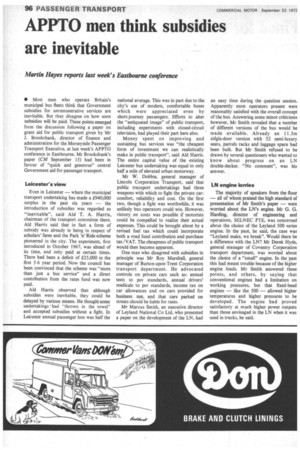APPTO men think subsidies are inevitable
Page 96

If you've noticed an error in this article please click here to report it so we can fix it.
Martin Hayes reports last week's Eastbourne conference
• Most men who operate Britain's municipal bus fleets think that Government subsidies for unremunerative services are inevitable. But they disagree on how soon subsidies will be paid. These points emerged from the discussion following a paper on grant aid for public transport given by Mr J. 13rooksbank, director of finance and administration for the Merseyside Passenger Transport Executive, at last week's APPTO conference in Eastbourne. Mr Brooksbank's paper (CM September 15) had been in favour of "quick and generous" central Government aid for passenger transport.
Leicester's view Even in Leicester — where the municipal transport undertaking has made a £940,000 surplus in the past six years — the introduction of subsidies was regarded as "inevitable", said Aid T. A. Harris, chairman of the transport committee there. Ald Harris said that in fact a form of subsidy was already in being in respect of scholars' fares and the Park 'n' Ride scheme pioneered in the city. The experiment, first introduced in October 1967, was ahead of its time, and only paid at certain times. There had been a deficit of £25,000 in the first 5-6 year period. Now the council has been convinced that the scheme was "more than just a bus service" and a direct contribution from the rates fund was now paid.
Aid Harris observed that although subsidies were inevitable, they could be delayed by various means. He thought some undertakings had -thrown in the towel" and accepted subsidies without a fight. In Leicester annual passenger loss was half the
national average. This was in part due to the city's use of modern, comfortable buses which were appreciated even by short-journey passengers. Efforts to alter the "antiquated image" of public transport, including experiments with closed-circuit television, had played their part here also.
Money spent on improving and sustaining bus services was "the cheapest form of investment we can realistically make in public transport", said Ald Harris. The entire capital value of the existing Leicester bus undertaking was equal to only half a mile of elevated urban motorway.
Mr W. Dobbie, general manager of Lincoln Corporation Transport, said that public transport undertakings had three weapons with which to fight the private car: comfort, reliability and cost. On the• first two, though a fight was worthwhile, it was unlikely bus operators could win. However, victory, on costs was possible if motorists could be compelled to realize their actual expenses. This could be brought about by a revised fuel tax which could incorporate both a road fund contribution and purchase tax /VAT. The cheapness of public transport would then become apparent.
One man who disagreed with subsidies in principle was Mr Roy Marshall, general manager of Burton-upon-Trent Corporation transport department. He advocated controls on private cars such as: annual tests to psv standards, annual drivers' medicals to psv standards, income tax on car allowances and on cars provided for business use, and that cars parked on streets should be liable for rates.
Mr Marcus Smith, an executive director of Leyland National Co Ltd, who presented a paper on the development of the LN, had an easy time during the question session. Apparently most operators present were reasonably satisfied with the overall concept of the bus. Answering some minor criticisms however, Mr Smith revealed that a number of different versions of the bus would be made available. Already an 11.3m single-door version with 52 semi-luxury seats, parcels racks and luggage space had been built. But Mr Smith refused to be drawn by several questioners who wanted to know about progress on an LN double-decker. "No comment", was his answer.
-LN engine lorries
The majority of speakers from the floor — all of whom praised the high standard of presentation of Mr Smith's paper — were worried about the LN's engine. Mr G. G. Harding, director of engineering and operations, SELNEC PTE, was concerned about the choice of the Leyland 500 series engine. In the past, he said, the case was "Leyland make, we break". Would there be a difference with the LN? Mr Derek Hyde, general manager of Coventry Corporation transport department, was worried about the choice of a "small" engine. In the past this had meant trouble because of the higher engine loads. Mr Smith answered these points, and others, by saying that conventional engines had a limitation on working pressures, but that fixed-head engines — like the 500 — allowed higher temperatures and higher pressures to be developed. The engine had proved satisfactory at much higher power outputs than those envisaged in the LN when it was used in trucks, he said.
































































































































































































































































































































































































































































































































